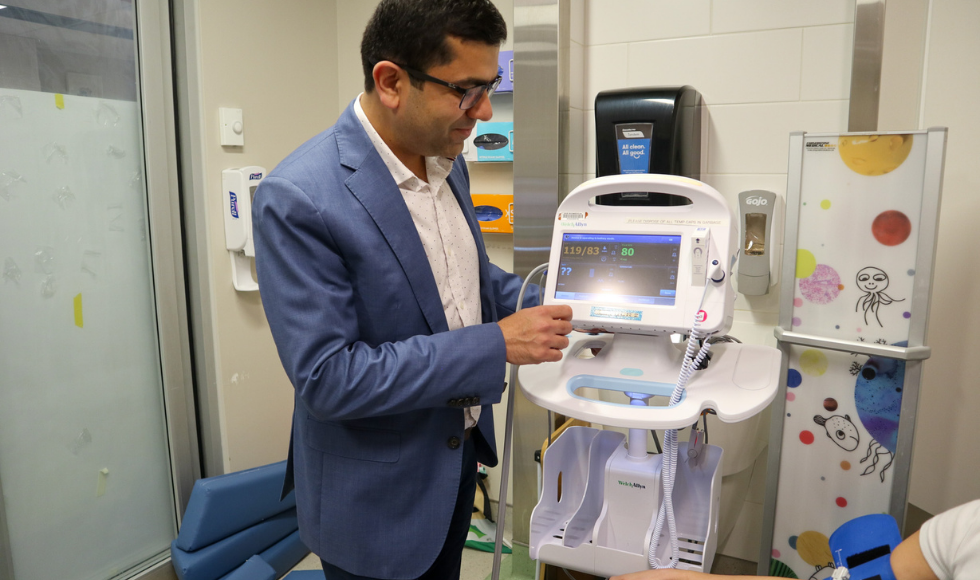McMaster study reveals long-term heart risks for children with hypertension

Youth with high blood pressure face significantly higher risks of serious heart conditions, including stroke and heart attack, a study by Rahul Chanchlani shows.
BY Cheryl Crocker, Faculty of Health Sciences
May 6, 2024
Fewer than 25 per cent of children have their blood pressure checked during visits to a family doctor, but that needs to change, a McMaster researcher says — and he has the evidence to prove it.
Rahul Chanchlani’s research, published in JAMA Pediatrics, analyzed the health records of thousands of Ontario children from 1993 to 2021. The findings revealed that youth with high blood pressure, or hypertension, face significantly increased long-term risks of serious heart conditions, including stroke and heart attack.
While guidelines recommend screening for hypertension in all kids aged 3-18, the practice remains largely absent in primary care, mainly because of a lack of evidence supporting it.
“When I talk to family doctors, they often ask about the long-term data and whether there is any potential harm with not checking kids’ blood pressure” said Chanchlani, an associate professor in the department of pediatrics and a pediatric nephrologist at McMaster Children’s Hospital.
Chanchlani turned to big data for answers. He tracked the outcomes of over 25,000 children with hypertension and compared them to approximately 128,000 children without the condition over a 15-year period.
Youth with hypertension were at twice the risk of major adverse heart events compared to their peers, he found.
What’s the solution?
While the solution may seem straightforward — a blood pressure check during regular visits to the family doctor — in practice, it is more complex: Ontario family doctors often lack access to nursing staff, pediatric-specific blood pressure machines and blood pressure cuffs, and time to settle active children before taking their blood pressure.
Creating awareness about high blood pressure in children is essential, Chanchlani says.
Empowering families and caregivers to raise the issue with their primary care providers, while also educating family doctors and other health-care practitioners, will be crucial.
“This study is just one of many steps needed to improve blood pressure screening in Canadian children,” says Chanchlani.
“Now, organizations like Hypertension Canada, the Canadian Pediatric Society, and the College of Family Physicians of Canada, all need to come to the table to say, ‘Hey, this is a major problem.’ ”
Crucial donor support
Chanchlani’s study started with a $100,000 Collaborative Research Excellence (CoRE) grant, an annual seed funding initiative established by a donation to McMaster’s department of Pediatrics.
Now in its third year, the program finances high-impact research with the potential to attract more grants in the future.
Chanchlani successfully applied for the funding in 2022, the first year it was offered. “Without CoRE, this research would not have been possible,” he says.
Two years later, with multiple studies published in high-impact journals, Chanchlani is turning to the next phase of his research, which will explore whether children with hypertension are also at an increased risk of kidney conditions.
This year, the Kidney Foundation of Canada announced its support for Chanchlani’s ALERT-BP study that aims to develop a tool to predict the risk of high blood pressure in young children. This partnership represents a proof-of-concept moment for CoRE and a significant achievement for pediatric researchers at McMaster.
With several CoRE projects in the pipeline and more expected to be funded this year, pediatric research is growing, says Gita Wahi, associate chair of research in McMaster’s department of Pediatrics.
“Dr. Chanchlani’s progress demonstrates the impact of this funding tool and that McMaster is hub of research excellence in child health. I look forward to seeing what’s next.”
Chanchlani’s research is being featured at the Pediatric Academies Society Conference in Toronto on May 6.


